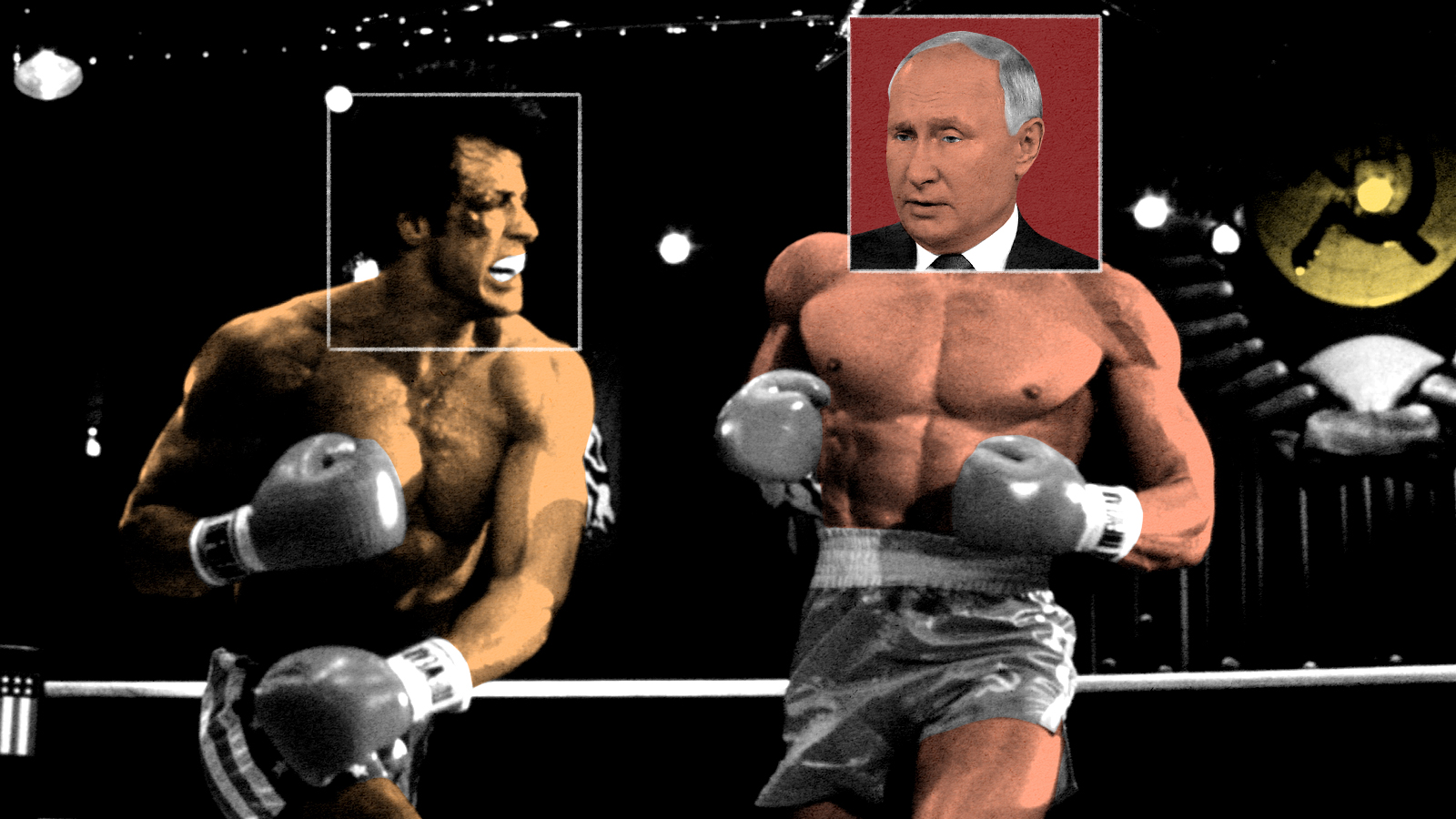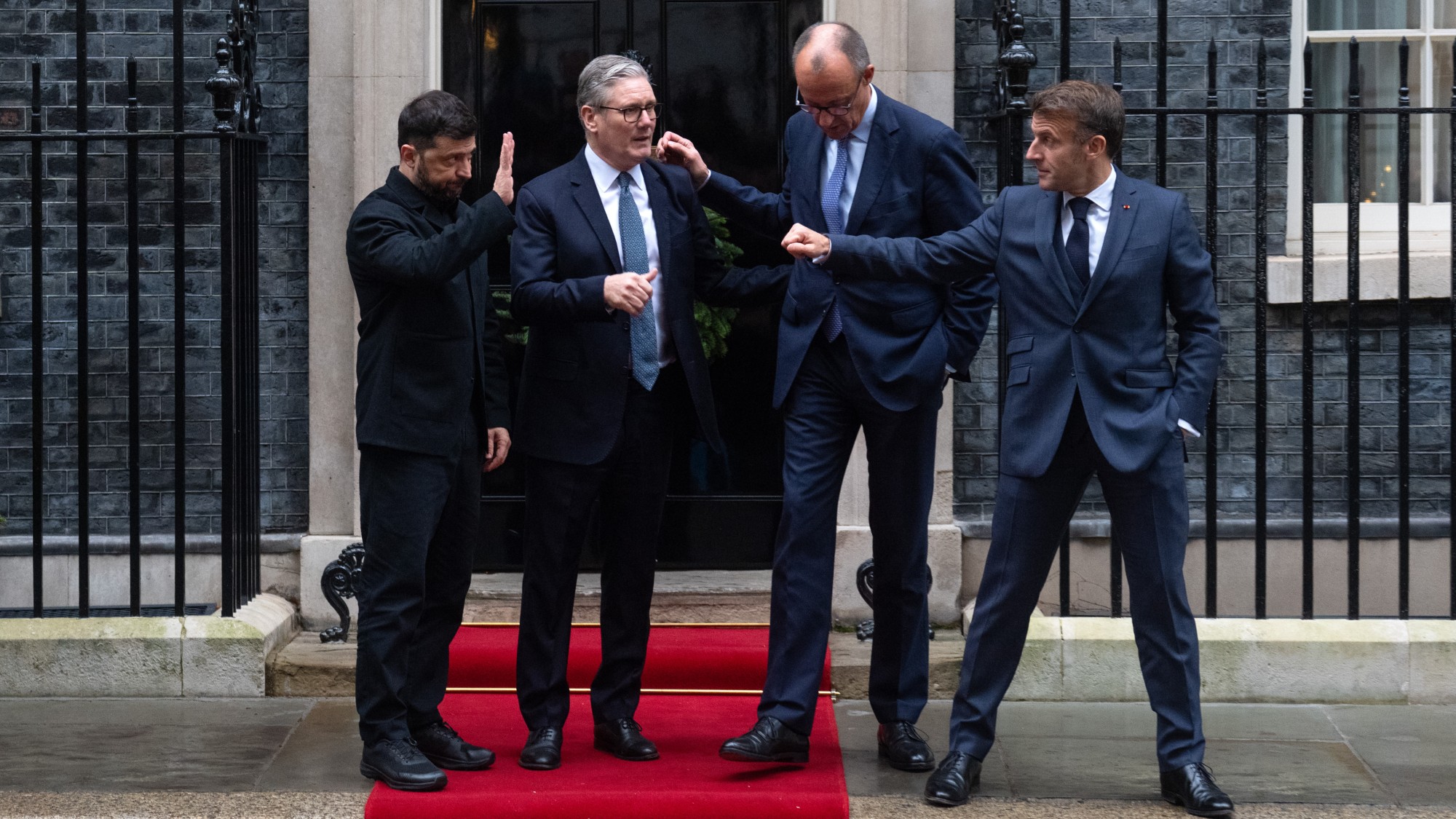Hollywood gets its favorite villain back
Russia's invasion of Ukraine means a Cold War redux in American entertainment


A free daily email with the biggest news stories of the day – and the best features from TheWeek.com
You are now subscribed
Your newsletter sign-up was successful
You know you're in trouble if even The New York Post is asking, "Too soon?"
But that's the magic of Hollywood, baby: Within hours of the Russian invasion upending the lives of 44 million Ukrainians late last month, Americans were already imagining who might play President Volodymyr Zelensky in a movie. Backlash was justifiably swift — it's like "people tweeting about which actor should play a 9/11 fireman ... while the towers are still burning," went one inspired comparison — though in a country that interprets so much of politics through the reductive lens of pop culture and superheroes, perhaps the fan casting was not entirely surprising.
Cynically, it might even be considered a bit of an American tradition. Hollywood, after all, has been fighting Washington's battles on screen for decades. And while studios detoured through fretting about an ascendant Japan in the late 1980s, Middle Eastern terrorists in the mid- to late-aughts, and China (very briefly, before its market was deemed too precious to threaten), we can now expect a rapid return of the Cold War's Big Bad: the scowling Russian.
The Week
Escape your echo chamber. Get the facts behind the news, plus analysis from multiple perspectives.

Sign up for The Week's Free Newsletters
From our morning news briefing to a weekly Good News Newsletter, get the best of The Week delivered directly to your inbox.
From our morning news briefing to a weekly Good News Newsletter, get the best of The Week delivered directly to your inbox.
For decades, all it took was a Russian accent to signpost to an audience: This dude is gonna do some murdering. "Inscrutable, humorless, but just enough like Americans to feel like you're not punching down — an uncanny-valley Borg version of ourselves," the Los Angeles Times wrote recently of Hollywood's erstwhile go-to antagonist. If you "need to communicate evil in five seconds," observed Thrillist, all you've got to do is "have an intimidating guy with a cigarette step out of the shadows and say, 'Da.'"
Red Scares faded somewhat after the fall of the Soviet Union, particularly while Hollywood flirted with Islamaphobic tropes instead. Not coincidentally, from 1999 until 2013, more Americans "considered Russia ... an ally or a friendly nation than an unfriendly nation or an enemy," Gallup reports. In a 2013 note quoted by the Times, one producer went so far as to predict we wouldn't see "many Russian or Chinese bad guys in the next decade, so viva la North Koreans and rogue terrorists."
But as tensions reignited between Washington and Moscow following the 2014 annexation of Crimea and election meddling in 2016, Slavic baddies started popping up again. They appear in Jack Ryan: Shadow Recruit (2014), John Wick (2014), The Amazing Spider-Man 2 (2014), Stranger Things (2016-present), Atomic Blonde (2017), Killing Eve (2018-present), and last year's Black Widow — to name only a very few. These Hollywood thugs are never nuanced — they're tropes precisely because they're shorthand for bad guys; no complicated backstory is required to justify a Russian being up to no good.
Does it matter off-screen? Maybe. Scholar Nina Khrushcheva (the great-granddaughter of that Khrushchev) has argued the villainization of Russians in American media is a contributing factor in Russian President Vladimir Putin's us against the world mentality. "He moved into that villainous image that was presented by Hollywood of Russia or Russian leaders," she wrote in 2014. "He watched all those movies. He was like, 'Well you're going to portray me as a villain anyway, so I might as well go and start biting off other parts from other countries.'"
A free daily email with the biggest news stories of the day – and the best features from TheWeek.com
It's of course a stretch to suggest Putin's invasion of Ukraine last month happened because he has a chip on his shoulder about Ivan Drago. But surely there are some real consequences of Hollywood's reactionary on-screen politics, which manifest in what Vanity Fair called "comfortably predictable" Russian villains who emerge "especially in an uncertain world where nothing is black and white." We're in that uncertain world now — and however much Hollywood screenwriters have looked for new national villains in recent years, Russia just cemented itself as the go-to Big Bad for decades to come.
And even if Putin is oblivious to our imaginings, there are dangers for us in this kind of simplistic nationalistic propaganda. It can encourage reckless policy choices, to say nothing of harm to individual Russians and Russian-Americans. While there are many Russians who support Putin's war, there are also many brave resisters risking their lives to protest it who are demoralized by the lack of international solidarity that comes from blanket Russophobia. And already, uninvolved (and even vehemently anti-war) Russian-Americans have found themselves the target of harassment and vandalism.
That outpouring of anti-Russian sentiment in America shouldn't be encouraged in our media. Beyond the ethics, moreover, it arguably plays into Kremlin strategy. In the years-long build-up to his invasion of Ukraine, Putin used his nation's massive internal propaganda operation to tell his people "Russia is fighting a vast global conspiracy," The Chicago Tribune explains. It only advantages Moscow to be able to point to American movies and say, "Look how much they hate us."
Not that that'll stop Hollywood. If Russian bad guys ever felt anachronistic, they certainly don't now. And, if we're even still here in a few years, you can bet Hollywood will do steady business off the emotions stirred in audiences by this war — which means villains named Sergey, Ivan, and Boris.
So maybe the error in fan-casting Zelensky wasn't just the reduction of real atrocities of war into cheap, consumable content. Maybe the fans also cast the wrong part first. Start with Vladimir, not Volodymyr, because Russian bad guys are forever.
Jeva Lange was the executive editor at TheWeek.com. She formerly served as The Week's deputy editor and culture critic. She is also a contributor to Screen Slate, and her writing has appeared in The New York Daily News, The Awl, Vice, and Gothamist, among other publications. Jeva lives in New York City. Follow her on Twitter.
-
 The EU’s war on fast fashion
The EU’s war on fast fashionIn the Spotlight Bloc launches investigation into Shein over sale of weapons and ‘childlike’ sex dolls, alongside efforts to tax e-commerce giants and combat textile waste
-
 How to Get to Heaven from Belfast: a ‘highly entertaining ride’
How to Get to Heaven from Belfast: a ‘highly entertaining ride’The Week Recommends Mystery-comedy from the creator of Derry Girls should be ‘your new binge-watch’
-
 The 8 best TV shows of the 1960s
The 8 best TV shows of the 1960sThe standout shows of this decade take viewers from outer space to the Wild West
-
 ‘The forces he united still shape the Democratic Party’
‘The forces he united still shape the Democratic Party’Instant Opinion Opinion, comment and editorials of the day
-
 The billionaires’ wealth tax: a catastrophe for California?
The billionaires’ wealth tax: a catastrophe for California?Talking Point Peter Thiel and Larry Page preparing to change state residency
-
 Trump considers giving Ukraine a security guarantee
Trump considers giving Ukraine a security guaranteeTalking Points Zelenskyy says it is a requirement for peace. Will Putin go along?
-
 Vance’s ‘next move will reveal whether the conservative movement can move past Trump’
Vance’s ‘next move will reveal whether the conservative movement can move past Trump’Instant Opinion Opinion, comment and editorials of the day
-
 Bari Weiss’ ‘60 Minutes’ scandal is about more than one report
Bari Weiss’ ‘60 Minutes’ scandal is about more than one reportIN THE SPOTLIGHT By blocking an approved segment on a controversial prison holding US deportees in El Salvador, the editor-in-chief of CBS News has become the main story
-
 Who is paying for Europe’s €90bn Ukraine loan?
Who is paying for Europe’s €90bn Ukraine loan?Today’s Big Question Kyiv secures crucial funding but the EU ‘blinked’ at the chance to strike a bold blow against Russia
-
 Will there be peace before Christmas in Ukraine?
Will there be peace before Christmas in Ukraine?Today's Big Question Discussions over the weekend could see a unified set of proposals from EU, UK and US to present to Moscow
-
 Moscow cheers Trump’s new ‘America First’ strategy
Moscow cheers Trump’s new ‘America First’ strategyspeed read The president’s national security strategy seeks ‘strategic stability’ with Russia
